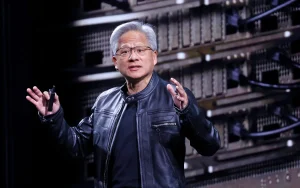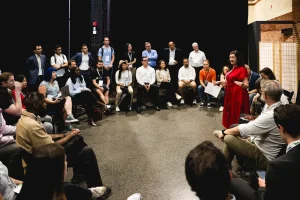Ephos’ Revolutionary Glass-Based Chip Design A Game Changer for AI and Quantum Computing

In a groundbreaking move, Ephos aims to revolutionize the AI and quantum computing market with an innovative chip design based on glass.
This breakthrough in photonics research promises faster and more efficient processors, addressing a critical need in advanced technology fields.
A New Dawn in Photonics
A theoretical physicist has made a significant breakthrough in photonics research, potentially transforming the efficiency and speed of processors. This innovation comes at a time when the demand for advanced computing power is skyrocketing due to the rise of AI and quantum computing.
Ephos, the startup behind this innovation, has attracted early backing from NATO, the European government, and other key investors. With $8.5 million in seed funding, Ephos is setting up a new R&D and manufacturing facility near Milan, focusing on glass-based quantum photonics.
Competing in a Crowded Field
Ephos joins other photonics pioneers like Xanadu, Photonic, and Oxford spinout Orca. However, Ephos sets itself apart by dedicating its facility to producing glass-based quantum photonic circuits, a first in the industry.
Andrea Rocchetto, CEO of Ephos, conceived the idea during the peak of Covid-19. After reconnecting with Italy’s talent pool, he saw an opportunity to address the gap in quantum technology startups. Teaming up with Francesco Ceccarelli, Giacomo Corrielli, and Roberto Osellame, they founded Ephos in 2022.
Rocchetto emphasizes that the current computational infrastructure is under significant stress. Innovations like AI and quantum computing are pushing the limits of today’s hardware, driving the need for faster, more efficient solutions.
The Power of Glass-Based Chips
Ephos aims to meet this demand by using glass-based chips that process light, or photons, for data transfer. This method promises high efficiency and minimal photon loss, making it an optimal solution for advanced computing needs.
Rocchetto explains that building the entire infrastructure on glass reduces coupling losses between fibers and chips, a common issue with silicon-based competitors.
These glass-based chips are expected to be more efficient and reliable, potentially leading to significant advancements in computational speed and energy efficiency.
Strategic Investments and Market Potential
The early interest in Ephos’ technology is notable. Quantum computing startups and hyperscale tech companies that build their own data centers are showing enthusiasm for these glass-based chips.
Leading the investment round is Starlight Ventures, joined by Collaborative Fund, Exor Ventures, 2100 Ventures, and Unruly Capital. Notable angels include executives from Amazon Web Services and Airbnb.
Ephos’ strategic location in Europe aligns with global efforts to strengthen regional infrastructure amid geopolitical and economic instability.
A Transatlantic Vision
Rocchetto is keen on building transatlantic ties, recognizing the defense sector’s historical role in adopting new computational technologies.
Ephos is getting backing from the European Innovation Council and NATO’s Defense Innovation Accelerator, highlighting the company’s potential in both commercial and defense applications.
The support from these significant entities underscores Ephos’ potential to make a substantial impact on both sides of the Atlantic.
Future Prospects
The quantum facility is already open, and the first chips are expected to be produced soon. Full operational status is projected by the end of the year.
Early projects indicate strong interest from big tech companies, signaling a promising future for Ephos’ glass-based chip technology.
With a focus on innovation and efficiency, Ephos is poised to set new standards in the AI and quantum computing industries.
Meeting the Energy Efficiency Challenge
In the U.S., about 9% of generated energy is used to run data centers, creating a demand for faster and more efficient systems. Ephos’ technology could be a game-changer in this regard, making data centers more sustainable.
By leveraging glass-based photonics, data transfer can be optimized, reducing the overall energy consumption and improving the performance of AI and quantum computing systems.
Ephos’ innovative glass-based chips hold the potential to redefine the landscape of AI and quantum computing.
With strategic investments and a clear vision, Ephos is set to lead the way in making technology faster, more efficient, and more reliable.





